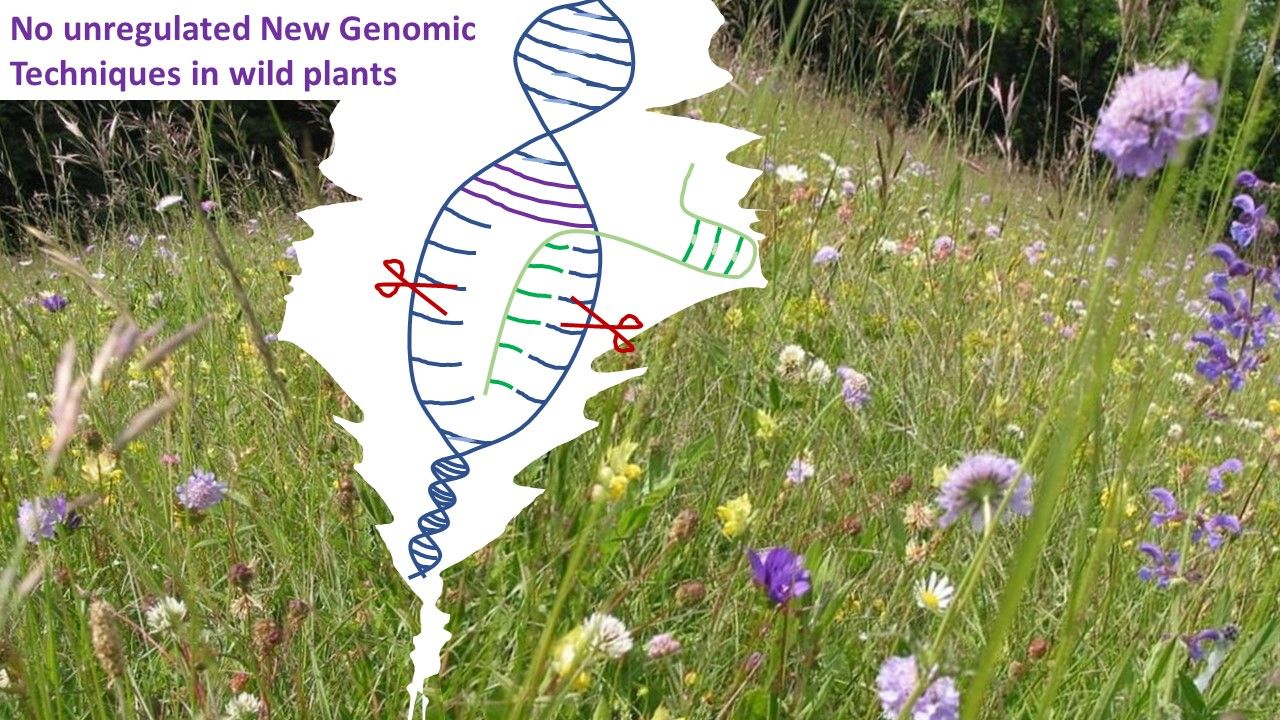Do not deregulate New Genomic Techniques (NGT) for wild plants!

To the Members of The European Parliament, the EU Commission, and EU Council
This petition is run by [% inititator_name %]
Petition
We call on the European Commission, Parliament and Council to not allow the deregulation of New Genomic Techniques for wild plants. The discussion about unregulated use of NGT must be limited to agricultural applications.
A fast, efficient, and safe transition towards sustainable agriculture is needed. It must be based on sound scientific evidence. Therefore, agricultural diversification must be prioritized over NGTs for promoting the EU Green Deal.
Why is this important?
An estimated minimum of 300,000 [2] plant species exist on Earth, and many are endangered. With the new legislation for the deregulation of New Genomic Techniques (proposal by the Commission [1]), so-called NGT1 can be applied to all of them without prior assessment of risks or benefits. Wild NGT1 plants could be manipulated and planted into natural populations without justification, without risk assessment, without liability and possibly without labeling.
Manipulated wild plants set out into the wild compromise the genetic integrity of natural plant populations. Wild NGT plants will inevitably reproduce with their wild relatives with unpredictable and irreversible consequences: they may introduce maladaptations or spread aggressively with potentially detrimental consequences for natural communities.
At the same time, the Parliament proposes that: “(13a) NGT plants with the potential to persist, reproduce or spread in the environment, within or beyond fields, should be evaluated with the highest level of scrutiny in respect of such plants’ impact on nature and the environment.”
Allowing unregulated NGT applications in the wild is in direct contradiction with this goal.
The most problematic applications with wild plants have been ignored in the current debate.
1) Application in research and DIY: Most plant scientists work with wild plants. Deregulating NGT1 for wild plants, will allow almost unrestricted field research with manipulated plants whose traits are subject to individual preferences and interests of researchers.
2) Applications in nature conservation: National [e.g., 4] and international laws are in place demanding a sound risk assessment prior to release of novel genotypes into the wild, for example for conservation purposes. The proposed new regulations are at odds with these laws.
3) Many wild plants are used in agriculture. Many of their traits may be detrimental for a life beyond agricultural fields. An example: NGT poplars with reduced lignin content or altered flowering times would greatly reduce fitness of wild poplars – a common wild tree in Europe.
The GFÖ- the largest scientific ecological society in Europe- maintains [4]:
- applications to all plants pose a serious risk for biodiversity protection
- the EU proposals lack ecological expertise
- a fast, efficient and safe path towards sustainable agriculture does not need technological promises such as NGT
Advocates of NGT for the Green Deal rely on many promises without sound scientific evidence, and major solutions for sustainable agriculture have been lost out of sight. Namely, myriads of scientific studies point towards a climate-resistant agriculture with largely reduced need for pesticides, herbicides, and fertilizer via diversification- of varieties within a field, crops among fields, or agricultural practices within and among farms [e.g., 5,6,]. Adopting such science-based solutions would enable the EU to spearhead a true agricultural revolution towards social and environmental sustainability.
--------------------------------------------------------------------------------------------------------------------
REFERENCES
1 European Commission 2023: 411 final 2023/0226 (COD) Proposal for a Regulation of the European Parliament and of the Council on plants obtained by certain new genomic techniques and their food and feed, and amending Regulation (EU) 2017/625. https://eur-lex.europa.eu/legal-content/EN/TXT/PDF/?uri=CELEX%3A52023PC0411
2 Mora C, et al. 2011: How many species are there on Earth and in the ocean? PLoS Biology 9: e1001127
3 §40 Abs. 2 Satz 3 BNatSchG (German Federal Law for Nature Conservation)
4 Expert Group “New Genomic Techniques”, Ecological Society of Germany, Austria and Switzerland (GFÖ) 2023: New genomic techniques from an ecological and environmental perspective: science-based contributions to the proposed regulations by the EU Commission. https://gfoe.org/sites/default/files/ngt_gfoe_final.pdf
5 He X et al. 2023 Agricultural diversification promotes sustainable and resilient global rice production. Nature Food 4: 788–796. https://doi.org/10.1038/s43016-023-00836-4
6 Rasmussen VL et al. 2024: Joint environmental and social benefits from diversified agriculture. Science 384: 87-93. DOI: 10.1126/science.adj1914
